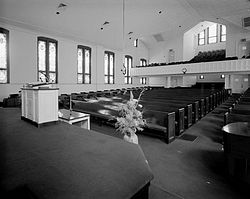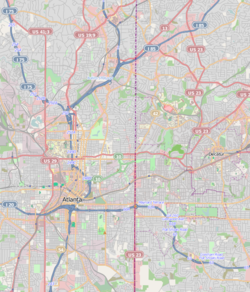Martin Luther King, Jr., National Historic Site
|
Martin Luther King Jr. National Historic Site and Preservation District
|
|

Interior of Ebenezer Baptist Church, view from behind the pulpit
|
|
| Location | Roughly bounded by Courtland, Randolph, Chamberlain Sts. and Irwin Ave. (original) and Roughly bounded by Freedom Pkwy., John Wesley Dobbs Ave., Decatur St., Southern RR tracks, and I-75/85 (increase), Atlanta, Georgia |
|---|---|
| Coordinates | 33°45′18″N 84°22′20″W / 33.75500°N 84.37222°WCoordinates: 33°45′18″N 84°22′20″W / 33.75500°N 84.37222°W |
| Area | 34.47 acres (13.95 ha) 13.04 acres (5.28 ha) federal) |
| Built | 1929 |
| Architect | Multiple |
| Architectural style | Late 19th and early 20th century American movements, Modern movement |
| Visitation | 624,848 (2005) |
| Website | Martin Luther King Jr. National Historic Site |
| NRHP Reference # | 74000677, 80000435, 00000741 |
| Significant dates | |
| Added to NRHP | May 2, 1974 (original) June 12, 2001 (increase) |
| Designated NHLD | May 5, 1977 |
| Designated NHS | October 10, 1980 |
The Martin Luther King Jr. National Historic Site consists of several buildings including Martin Luther King Jr.'s boyhood home and the original Ebenezer Baptist Church, the church where King was baptized and both his father Martin Luther King Sr., and he were pastors. These places, critical to the interpretation of the life of Martin Luther King Jr. and his legacy as a leader of the American Civil Rights Movement, were included in the National Historic Site when it was established on October 10, 1980.
In total, the buildings included in the site make up 35 acres (0.14 km²). The visitor center contains a museum that chronicles the American Civil Rights Movement and the path of Martin Luther King Jr. An 1894 firehouse (Fire Station No. 6) served the Sweet Auburn community until 1991, and now contains a gift shop and an exhibit on desegregation in the Atlanta Fire Department. The "I Have a Dream" International World Peace Rose Garden, and a memorial tribute to Mohandas K. Gandhi are part of the site, as is the "International Civil Rights Walk of Fame" which commemorates some of the courageous pioneers who worked for social justice.
Annual events celebrating Martin Luther King Jr. Day in January typically draw large crowds. Speakers have included Presidents of the United States, national and local politicians, and civil rights leaders. Remembrances are also held during Black History Month (February), and on the anniversary of King's April 4, 1968, assassination in Memphis, Tennessee.
...
Wikipedia



